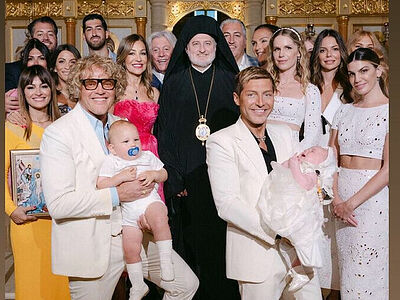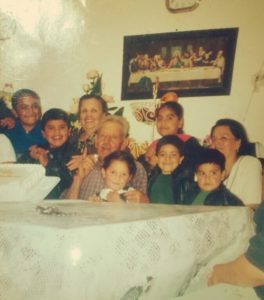New York, May 14, 2024
 Photo: lifo.gr
Photo: lifo.gr
Over the weekend, the outlet lifo.gr published an interview with Archbishop Elpidophoros of the Patriarchate of Constantinople’s Greek Orthodox Archdiocese of America entitled, “Discriminating against people based on their love life isn’t Orthodoxy.”
In the interview, the Archbishop discusses the Baptism that he served in Greece in the  Abp. Elpidophoros praised for serving “first openly gay baptism”In the midst of the ongoing scandal involving the Archbishop’s plans to consecrate a defrocked former priest as a bishop for the Greek Orthodox Archdiocese of America, which other hierarchs have characterized as a serious threat to Orthodox unity in America, the GOARCH head has made headlines by baptizing the children of a gay celebrity couple.
Abp. Elpidophoros praised for serving “first openly gay baptism”In the midst of the ongoing scandal involving the Archbishop’s plans to consecrate a defrocked former priest as a bishop for the Greek Orthodox Archdiocese of America, which other hierarchs have characterized as a serious threat to Orthodox unity in America, the GOARCH head has made headlines by baptizing the children of a gay celebrity couple.
“>summer of 2022, dubbed the Greek Church’s “first openly gay Baptism” by one of the gay fathers of the children who were baptized.
The event became an international scandal, and the Greek Holy Synod  Greek Synod sends protest letter to Abp. Elpidophoros about “gay baptism”The Permanent Holy Synod of the Church of Greece decided today to send a letter of protest to Archbishop Elpidophoros of Constantinople’s Greek Orthodox Archdiocese of America regarding the Baptism that he recently celebrated for the children of a gay celebrity couple.
Greek Synod sends protest letter to Abp. Elpidophoros about “gay baptism”The Permanent Holy Synod of the Church of Greece decided today to send a letter of protest to Archbishop Elpidophoros of Constantinople’s Greek Orthodox Archdiocese of America regarding the Baptism that he recently celebrated for the children of a gay celebrity couple.
“>sent a letter of protest to Abp. Elpidophoros and a corresponding letter to Patriarch Bartholomew. The Archbishop was  Abp. Elpidophoros on Athos: Visits several monasteries, not given customary reception by monastic governing bodyThe Archbishop and his fellow pilgrims visited five monasteries, serving at some of them, but he was not afforded the customary reception of a hierarch by the Epistasia.”>not accorded the usual greeting of a hierarch when he visited Mt. Athos in January of this year because of the public spectacle surrounding the “gay Baptism.”
Abp. Elpidophoros on Athos: Visits several monasteries, not given customary reception by monastic governing bodyThe Archbishop and his fellow pilgrims visited five monasteries, serving at some of them, but he was not afforded the customary reception of a hierarch by the Epistasia.”>not accorded the usual greeting of a hierarch when he visited Mt. Athos in January of this year because of the public spectacle surrounding the “gay Baptism.”
Nevertheless, Abp. Elpidophoros affirms in the new interview that he would absolutely serve such a Baptism again.
He also compares the hierarchs of the Greek Church who openly protested the  Greece becomes first Orthodox country to legalize gay marriageGreek Parliament voted late last night, despite the fierce and persistent resistance from the Church and society, to legalize gay marriage and adoption by gay couples.
Greece becomes first Orthodox country to legalize gay marriageGreek Parliament voted late last night, despite the fierce and persistent resistance from the Church and society, to legalize gay marriage and adoption by gay couples.
“>legalization of gay marriage in Greece with antisemites and Nazis.
Abp. Elpidophoros also argues that because 70% of Orthodox marriages in America today are to non-Orthodox or even non-Christians, the Church can’t have an “exclusionary mentality.” He has  Abp. Elpidophoros publicly reiterates his stance on open Communion for non-Orthodox spousesIn a virtual town hall meeting held yesterday, Saturday, April 11, Archbishop Elpidophoros of the Greek Orthodox Archdiocese of the Patriarchate of Constantinople publicly reiterated his belief that non-Orthodox spouses who were married in the Orthodox Church should be allowed to receive Holy Communion in the Orthodox Church.
Abp. Elpidophoros publicly reiterates his stance on open Communion for non-Orthodox spousesIn a virtual town hall meeting held yesterday, Saturday, April 11, Archbishop Elpidophoros of the Greek Orthodox Archdiocese of the Patriarchate of Constantinople publicly reiterated his belief that non-Orthodox spouses who were married in the Orthodox Church should be allowed to receive Holy Communion in the Orthodox Church.
“>openly stated in the past that because of the prevalence of these mixed marriages, the non-Orthodox spouses of Orthodox Christians should be allowed to receive Holy Communion in Orthodox churches.
Read the relevant portion of the Archbishop’s new interview:
—Is there room for modernization in the Church?
—Over the years, the Church has changed and evolved. Clearly, what cannot be influenced are the principles of the faith. Everything else, however, can be modernized. Undoubtedly, some people get agitated even at the mention of the word “change.” I advocate that the practice of our religious duties cannot be threatened, just adapted. You change the way the truth of the Gospel is expressed. You put new wine into old wineskins, as our sacred texts mention. Confidence and courage are needed from the clergy so that in every era we can speak the language and communication codes of the time. Otherwise, we only manage to marginalize the Church and put ourselves out of community. Consider that today 70% of marriages in the United States are made with non-Orthodox and in many cases non-Christians. Therefore, if we adopt an exclusionary mentality, our flock will diminish each year. However, the Church has always embraced and will embrace all people. Everyone is accepted and welcome.
—You faced intense criticism for serving the first Baptism of a same-sex couple’s children in Greece. After everything that was written and said, do you have any regrets?
—First, let’s clarify, because this was also misinterpreted, that we are talking about a Baptism ceremony, not a marriage. When the parents asked me to baptize their children, as I was obliged to do, I accepted with great joy. Besides, the Godparents were Orthodox and I had absolutely no reason to refuse. This novel and truly incredible criterion that some use, namely that we must discriminate against people based on their sexual life, is not Orthodoxy, it doesn’t even count as a humane attitude. We can’t elevate sexual behavior and someone’s love life as the sole criterion either to accept or reject them. These are unprecedented things and I would say that in Greece, they are a result of an imported Western Puritanism. For example, they interpret the original sin as sexual. If you read Genesis, nowhere does it mention sex nor that the original sin was related to a “sexual” act. Essentially, it was nothing more than the rejection of God’s authority on moral issues, namely disobedience, i.e. a misuse of the freedom of choice. We don’t even know if it was an apple, if it was generally a fruit, because it doesn’t matter. The motive was selfishness and ambition, not sex or love. It was a Puritan fabrication and nothing else, aimed at incriminating sexual acts and romantic behavior, and on top of this guilt narrative, which has nothing to do with Christian teaching, some invested in order to control people, projecting an inherited punishment. Thus, we reached, even in Greece, this extreme phenomenon, where the sexual behavior of a person becomes a criterion for any discrimination in professional, social, or political spheres, even within the Church. It is entirely un-Christian and never has Greek culture weighed any person according to their romantic behavior. We must condemn all forms of violence, verbal and physical, and denounce the hatred and prejudice based on each person’s differences.
—Did the criticism and what was written about your trip to Mount Athos and the possibility of a postponement because you would not be welcomed bother you?
—Criticism makes us all better and it doesn’t bother me. What saddened me is that the facts were misrepresented, something that also reflects the real intention of the people who protested. What we eventually saw happen is a defamation campaign on the verge of yellow journalism. I repeat, all I did was baptize two little children. And it’s something I would do again, without any difficulty.
—On the occasion of the voting on the marriage equality bill, we heard incendiary statements from metropolitans like Nikolaos of Mesogaias, who in his lengthy report to the Synod characterized homosexuality as a deviation and mentioned that “our biggest mistake would be to accept that the homosexual act, apart from being a psychological disorder, is not also a sin.” How would you comment on that?
—Look, I listen carefully to everyone who seeks my advice. However, I am neither a psychologist nor a psychiatrist. Therefore, to come out publicly and stigmatize anyone, I must tell you, I consider it fascistic. And fascistic behaviors are based on blaming our fellow citizens for some reason. We have seen it historically happen, e.g., with the Nazis. It’s an extremely dangerous mentality, which manifests in various aspects. Look what’s happening with the rising trend of antisemitism. Therefore, is it possible for the Church to give the impression that it blesses or covers up or tolerates such behaviors with its silence? This is a malignant disease, a carcinoma that will spread to other parts of the body. Today it may be Jews, tomorrow homosexuals, the day after tomorrow dark-haired, blond people, and at some point, fascism will knock on our door and we will feel the cold metal cutting our neck. Especially, the degree of antisemitism in a society shows how healthy it is. These are ideologies that bloodied Europe and the world and can have no relation to Christian theology, no matter how some try to dress their extreme ideological fantasies in a Christian cloak.
—There were also some metropolitans who argued that those who voted for the marriage equality bill should be banned from entering the churches. What did you think of this?
—You see how the cancer I told you about progresses? Do you see that when something is left unchecked, it goes further? The abscess must be cut and we need to set a limit, because as a society, we’re very likely at risk. It’s clear, therefore, that fascist behaviors have no place in the Church.
Follow OrthoChristian on Twitter, Vkontakte, Telegram, WhatsApp, MeWe, and Gab!

 Abp. Elpidophoros praised for serving “first openly gay baptism”In the midst of the ongoing scandal involving the Archbishop’s plans to consecrate a defrocked former priest as a bishop for the Greek Orthodox Archdiocese of America, which other hierarchs have characterized as a serious threat to Orthodox unity in America, the GOARCH head has made headlines by baptizing the children of a gay celebrity couple.
Abp. Elpidophoros praised for serving “first openly gay baptism”In the midst of the ongoing scandal involving the Archbishop’s plans to consecrate a defrocked former priest as a bishop for the Greek Orthodox Archdiocese of America, which other hierarchs have characterized as a serious threat to Orthodox unity in America, the GOARCH head has made headlines by baptizing the children of a gay celebrity couple. Greek Synod sends protest letter to Abp. Elpidophoros about “gay baptism”The Permanent Holy Synod of the Church of Greece decided today to send a letter of protest to Archbishop Elpidophoros of Constantinople’s Greek Orthodox Archdiocese of America regarding the Baptism that he recently celebrated for the children of a gay celebrity couple.
Greek Synod sends protest letter to Abp. Elpidophoros about “gay baptism”The Permanent Holy Synod of the Church of Greece decided today to send a letter of protest to Archbishop Elpidophoros of Constantinople’s Greek Orthodox Archdiocese of America regarding the Baptism that he recently celebrated for the children of a gay celebrity couple. Abp. Elpidophoros on Athos: Visits several monasteries, not given customary reception by monastic governing bodyThe Archbishop and his fellow pilgrims visited five monasteries, serving at some of them, but he was not afforded the customary reception of a hierarch by the Epistasia.”>not accorded the usual greeting of a hierarch when he visited Mt. Athos in January of this year because of the public spectacle surrounding the “gay Baptism.”
Abp. Elpidophoros on Athos: Visits several monasteries, not given customary reception by monastic governing bodyThe Archbishop and his fellow pilgrims visited five monasteries, serving at some of them, but he was not afforded the customary reception of a hierarch by the Epistasia.”>not accorded the usual greeting of a hierarch when he visited Mt. Athos in January of this year because of the public spectacle surrounding the “gay Baptism.”  Greece becomes first Orthodox country to legalize gay marriageGreek Parliament voted late last night, despite the fierce and persistent resistance from the Church and society, to legalize gay marriage and adoption by gay couples.
Greece becomes first Orthodox country to legalize gay marriageGreek Parliament voted late last night, despite the fierce and persistent resistance from the Church and society, to legalize gay marriage and adoption by gay couples. Abp. Elpidophoros publicly reiterates his stance on open Communion for non-Orthodox spousesIn a virtual town hall meeting held yesterday, Saturday, April 11, Archbishop Elpidophoros of the Greek Orthodox Archdiocese of the Patriarchate of Constantinople publicly reiterated his belief that non-Orthodox spouses who were married in the Orthodox Church should be allowed to receive Holy Communion in the Orthodox Church.
Abp. Elpidophoros publicly reiterates his stance on open Communion for non-Orthodox spousesIn a virtual town hall meeting held yesterday, Saturday, April 11, Archbishop Elpidophoros of the Greek Orthodox Archdiocese of the Patriarchate of Constantinople publicly reiterated his belief that non-Orthodox spouses who were married in the Orthodox Church should be allowed to receive Holy Communion in the Orthodox Church.






